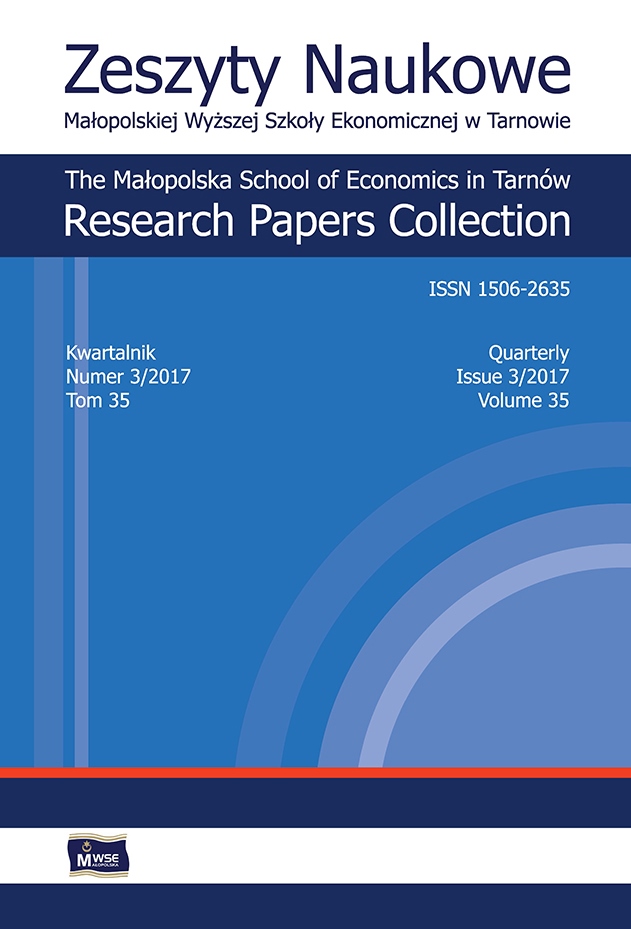Abstract
Since 2016 changes in the system of education in Poland have been planned. These changes cannot be effectively implemented without appropriate changes in the public finance system. The organisation and funding of education in Poland is in vast majority executed by local government units which are responsible for the quality and scope of education services provided in a given area. Therefore, the problem of education funding is of interest to many environments. The plans of the education system reform have generated even bigger interest in these issues. The aim of this article is to assess the proposed changes in the system of education funding with regard to the concepts put forward by the representatives of three bodies: the government, local governments and citizens. The analysis included the assessment of the scope of the changes in the education funding system, sources of funding for these changes and their economic outcomes. The analysis has shown that the proposals regarding changes in funding educational tasks by local government units put forward by the government and citizens do not indicate either the procedure for implementing the expected changes or the source of funding for them, while the prospective economic outcome of the proposed changes is only included in the concepts proposed by local governments. Consequently, this situation is not conducive to developing a coherent model of funding educational tasks in Poland with the reform of the system of education in progress.
References
Davies, H.T.O., Nutley, S.M., Smith, P.C. (eds.). (2009). What Works? Evidence-Based Policy and Practice in Public Services. Bristol: The Policy Press. ISBN 9781861341914.
View in Google Scholar
Dye, T.R. (2013). Understanding Public Policy. Upper Saddle River: Pearson Education Inc. ISBN 9780205238828.
View in Google Scholar
Górniak, J., Mazur, S. (2012). Analiza polityk publicznych i programowanie w obszarze strategii rozwoju. W: J. Górniak, S. Mazur (red.). Zarządzanie strategiczne rozwojem (s. 185–220). Warszawa: Ministerstwo Rozwoju Regionalnego. ISBN 9788389437624.
View in Google Scholar
Hausner, J. i in. (2013). Narastające dysfunkcje, zasadnicze dylematy, konieczne działania. Raport o stanie samorządności terytorialnej w Polsce. Kraków: Uniwersytet Ekonomiczny. Małopolska Szkoła Administracji Publicznej; Fundacja Gospodarki i Administracji Publicznej. ISBN 9788389410375.
View in Google Scholar
Herbst, M., Herczyński, J., Levitas, A. (2009). Finansowanie oświaty w Polsce. Diagnoza, dylematy, możliwości. Warszawa: Wydawnictwo Naukowe Scholar. ISBN 9788373833555.
View in Google Scholar
Kirkpatrick, C., Parker, D. (2007). Regulatory Impact Assessment: Towards Better Regulation? Cheltenham: Edward Elgar Publishing. ISBN 9781845424121.
View in Google Scholar
Klawenek, A. (red.). (2014). Wynagrodzenia w oświacie 2014. Warszawa: C.H. Beck. ISBN 9788325562519.
View in Google Scholar
Kleer, J. (2009). Gospodarka oparta na wiedzy a globalizacja: związki czasowe i przyczynowe. W: J. Kotowicz-Jawor (red.). GOW – wyzwanie dla Polski (s. 69–79). Warszawa: PWE. ISBN 9788388700293.
View in Google Scholar
Krueger, A.B. (2003). Economic considerations and class size. The Economic Journal, 113, 34–63.
View in Google Scholar
Latarola, P., Stiefel, L. (2003). Intra-district equity of public education resources and performance. Economics of Education Review, 22(1), 69–78.
View in Google Scholar
Ofiarski, Z. (2012). Finanse publiczne i prawo finansowe. Realia i perspektywy zmian. Białystok: Temida 2. ISBN 9788362813230.
View in Google Scholar
Osiecka-Chojnacka, J. (2010). Rola centralnych władz oświatowych w reformowanym systemie oświatowym. Studia BAS, 2, 9–40.
View in Google Scholar
Owsiak, S. (2016). System podatkowy Polski w okresie transformacji – próba oceny. Annales Universitatis Mariae Curie-Skłodowska. Sectio H: Oeconomia, 50(1), 15–27.
View in Google Scholar
Pawson, R. (2006). Evidence-Based Policy: A Realist Perspective. London: Sage. ISBN 1412910609.
View in Google Scholar
Rachwał, M. (2010). Demokracja bezpośrednia w procesie kształtowania się społeczeństwa obywatelskiego. Warszawa: Wydawnictwo Sejmowe. ISBN 9788376660264.
View in Google Scholar
Ruśkowski, E. (2004). Finanse lokalne w dobie akcesji. Warszawa: Dom Wydawniczy ABC. ISBN 9788375262421.
View in Google Scholar
Schwartz, A.E., Rubenstein, R., Stiefel, L. (2016). Why Do Some Schools Get More and Others Less? An Examination of School-Level Funding in New York City. New York: Institute for Education and Social Policy; New York University.
View in Google Scholar
Stiglitz, J.E. (1992). The design of financial systems for the newly emerging democracies of Eastern Europe. W: Ch. Clague, G.C. Rausser (eds.). The Emergence of Market Economies in Eastern Europe. Cambridge: Blackwell Publishers. ISBN 1557863334.
View in Google Scholar
Suchecka, J., Marciniak, A. (2016). Szkoła. Chaos za miliony. Gazeta Wyborcza, 23–24 lipca, 5.
View in Google Scholar
Trykozko, R. (2010). Ustawa o finansach publicznych. Komentarz dla jednostek samorządu terytorialnego. Warszawa: Taxpress. ISBN 9788392855323.
View in Google Scholar
© Copyright by Małopolska School of Economics in Tarnów. The articles are available under the Creative Commons Attribution NonCommercial-NoDerivatives 4.0 International License


